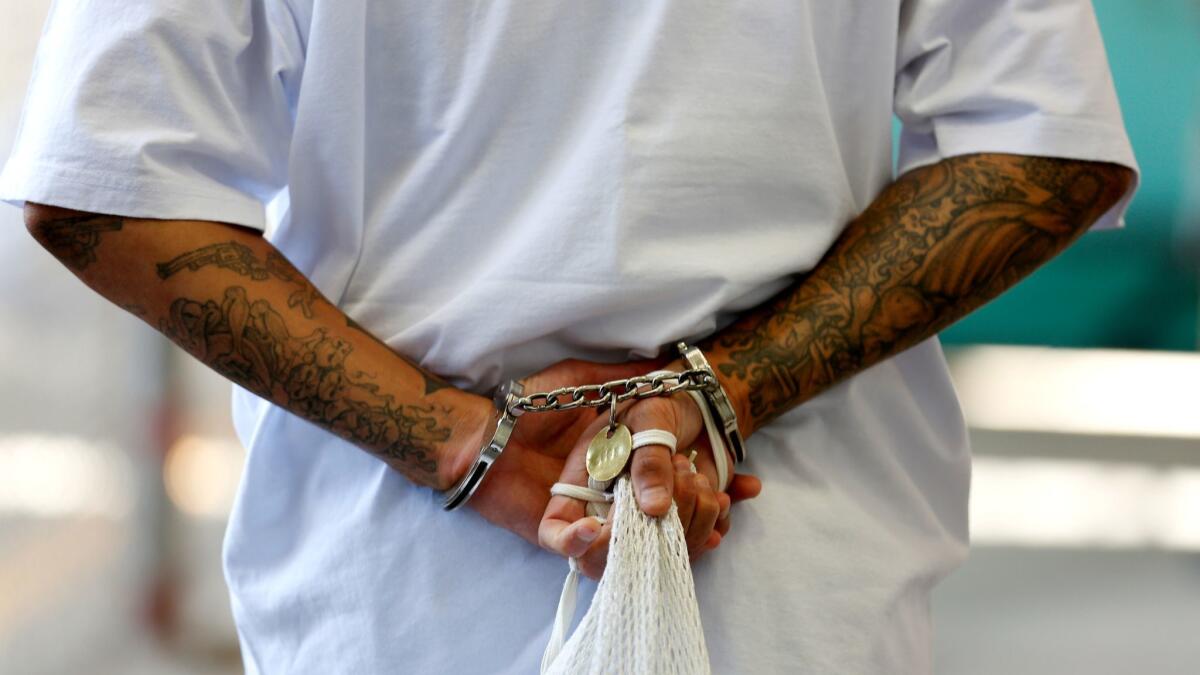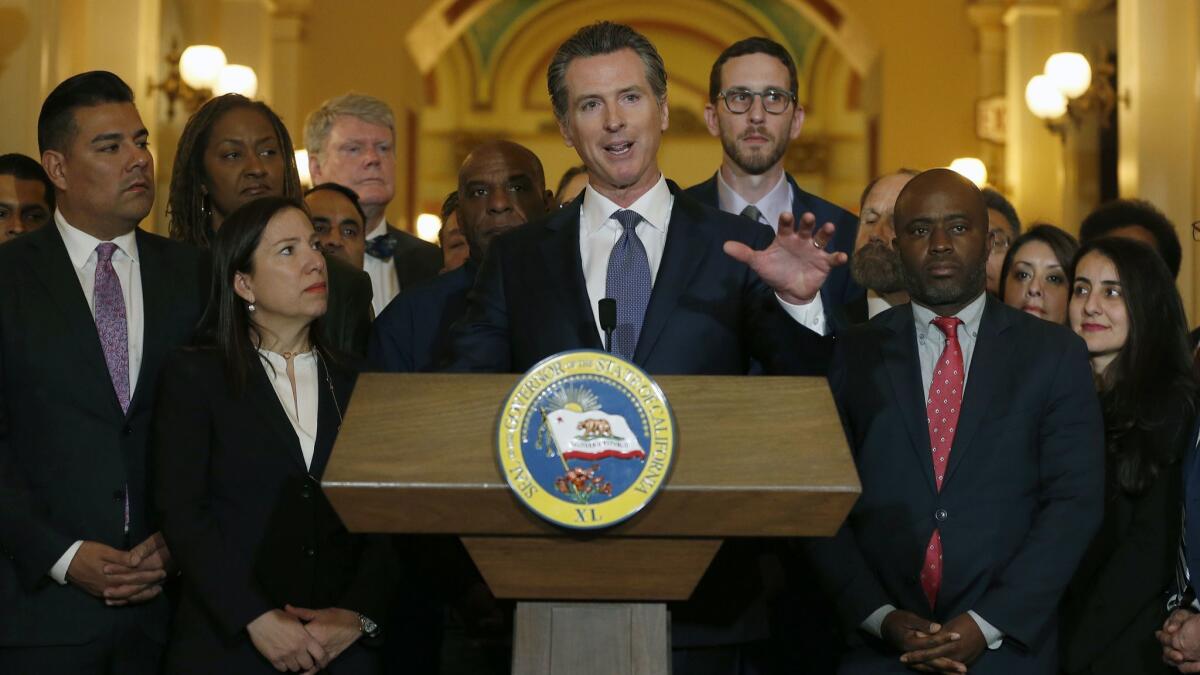Poll finds Californians support the death penalty — and Newsom’s moratorium on executions

Reporting from Sacramento — Californians narrowly support Gov. Gavin Newsom’s moratorium on death row executions but they oppose abolishing the death penalty outright, a new poll shows.
The findings offer some political affirmation for the Democratic governor who, after calling the death penalty immoral and unjust, stirred up controversy in March by issuing temporary reprieves to more than 700 inmates on California’s death row.
Conducted for the Los Angeles Times by UC Berkeley’s Institute for Governmental Studies, the poll found that 52% of California voters backed Newsom’s decision to grant a blanket reprieve to all condemned inmates on death row, compared with 48% who opposed the governor’s action. The partisan divide was substantial, with 72% of Democrats supporting the moratorium and 85% of Republicans against it.
But the survey also shows that a majority of Californians support capital punishment. Just over 61% of California voters said they supported keeping the death penalty as a “possible punishment for serious crimes,” compared with 39% who said it should be abolished, the poll found.
That might not portend well for a proposed 2020 statewide ballot measure that would end executions and replace death sentences with life imprisonment without the possibility of parole. Just over 46% of California voters support the proposed constitutional amendment but a majority, 53%, oppose it, the poll found.
Shilpi Agarwal, a staff attorney with an expertise in criminal justice at the American Civil Liberties Union of Northern California, said the support for both the death penalty and the moratorium may be because of a difference in how people feel about capital punishment in theory versus how they see it being carried out.
“A majority of people recognize that it is a broken system in practice and for that reason a moratorium is appropriate,” she said.
When announcing the moratorium on executions, Newsom argued that the death penalty discriminates against defendants who are poor, mentally ill, African American or Latino. He also noted that death row inmates in California and other states have been exonerated.
Berkeley Institute for Governmental Studies pollster Mark DiCamillo said the survey results could indicate that those arguments may have been convincing enough for Californians to back Newsom’s moratorium.
A majority of voters surveyed, however, did not support permanently abolishing the death penalty, probably because of awareness of slaying suspects such as Joseph James DeAngelo Jr., charged with killing at least 13 people and accused of raping more than 50 women in the Golden State Killer case, DiCamillo said.
“There’s a certain class of crime that is so heinous that the public just wants to reserve the right for death,” DiCamillo said.
Preserving the death penalty was favored by a majority of men and women and across age groups, incomes and regions of California. A majority of registered Democrats, African American voters and Californians with post-graduate degrees opposed the death penalty, the survey found.
Kent Scheidegger, legal director of the pro-death penalty Criminal Justice Legal Foundation, said support for capital punishment has been consistent in recent years.

Man in the Window: The story of the Golden State Killer »
That point was most recently proved in 2016, when California voters rejected a ballot measure to abolish capital punishment and approved anotherto expedite the appeals process. Leading up to that election, campaign ads by pro-death penalty groups highlighted murders committed by death row inmates.
“It’s one thing to talk about this issue in the abstract and it’s quite another when you know the actual facts of what people really did,” Scheidegger said. “That affects people’s decision, and it should because that’s really what it’s all about.”
Still, support for the death penalty has steadily declined in California. Thirty years ago, 82% of California voters supported capital punishment and just 14% wanted it abolished, according to a Field Poll. DiCamillo worked for the Field Poll before moving to the Berkeley institute and said that, while the polls used differently methodologies, the wording of the death penalty questions on the two polls was identical.
The new poll found California voters were more amenable to a proposed ballot measure to abolish the death penalty and replace it with life in prison without the possibility of parole. The constitutional amendment was proposed by Assemblyman Marc Levine (D-San Rafael) in March and will appear on the 2020 ballot if approved by a two-thirds majority in both chambers of the California Legislature.
Though a slim majority of those polled said they opposed the measure, Levine is confident that Californians will vote to abolish the death penalty because he expects Newsom and Democratic leaders in the Legislature to make a case in favor of ending capital punishment that is strong enough to overcome the messaging of death penalty supporters.
“We need moral leadership to make the case to voters who have otherwise been led to believe that the death penalty makes us safer when we know it doesn’t,” Levine said. “If we lock murderers up and throw away the key, we still protect victims and their families of those crimes and never risk executing someone who is innocent.”
DiCamillo said the poll results indicate that some death penalty supporters would back the proposed ballot measure, likely in part because of its assurance that current death row inmates would not leave prison if executions were abolished. Still, arguments against execution were not persuasive enough to win majority support in the poll.
“People in some ways think that that’s the preferable way to go,” DiCamillo said of life in prison without the possibility of parole. “But there’s a segment of the public that believes there will be some way, somehow down they road they will be able to get out.”
The poll, which also asked voters about the 2020 presidential race and other issues, surveyed 4,435 registered voters statewide and was conducted online June 4 to 10. The results have an estimated sampling error of roughly 3 percentage points in either direction.
California has executed 13 people since the U.S. Supreme Court reinstated the death penalty in 1976. During that same time, 80 death row inmates have died of natural causes and 26 have died by suicide, according to the California Department of Corrections and Rehabilitation.
Using his executive powers under the California Constitution, Newsom in March imposed a blanket reprieve of all death row inmates in California and vowed that no executions would take place while he served as governor. He also ordered the death chamber at San Quentin State Prison to be shuttered and suspended the state’s efforts to devise a method of lethal injection that would pass constitutional muster.
Reprieves are in essence temporary stays of execution and can be lifted when Newsom leaves the governor’s office.
The moratorium was one of the first major actions Newsom made after being sworn in as California’s 40th governor in January. Newsom’s first proposed budget, which was approved by the California Legislature last week, expands Medi-Cal coverage for immigrants in the country illegally and paid family leave.
Close to 57% of California voters approve of the job Newsom has been doing as governor, with 42% saying they disapprove, according to the poll.
Twitter: @philwillon
More to Read
Get the L.A. Times Politics newsletter
Deeply reported insights into legislation, politics and policy from Sacramento, Washington and beyond. In your inbox three times per week.
You may occasionally receive promotional content from the Los Angeles Times.











